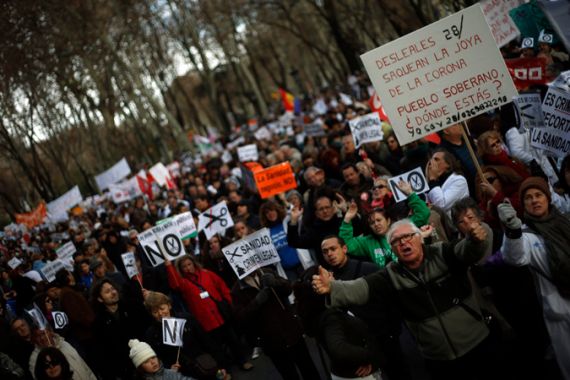Spaniards march against private health care
Thousands demonstrated in Madrid against plans to privatise parts of their public health care system.

Thousands of people marched in Madrid to protest plans to privatise parts of their public health care system, with some questioning the motives behind the government’s actions.
The march by employees and users of the system is the year’s second large “white tide” demonstration, named after the colour of the medical scrubs many protesters wear.
“There will be a first class health system and a second class one and the second class health system will not have any coverage at all. We should all fight together, and now for the first time doctors have joined these protests,” said Lola, a doctor who took part in the demonstration.
Several similar marches took place last year.
Demonstrators packed main boulevards in the centre of the Spanish capital, carrying banners saying, “Public health care should be defended, not sold off.”
The Madrid region has proposed selling the management of six of 20 large public hospitals in its jurisdiction and 10 percent of its 268 public health centres.
It says these reforms are needed to secure health services during Spain’s economic crisis. But protesters were sceptical.
‘Politically inspired’
“This measure is politically inspired and not financial,” said Mario Sola, 47, a mechanical engineer. “If public hospitals were unsustainably loss-making as we’re being told, private enterprise wouldn’t be interested.”
Jose Gabriel Gonzalez Martin, president of Spain’s Independent Civil Service Trade Union Center, said many people’s suspicions were aroused when former government health officials acquired jobs with private companies lining up to take over medical analysis functions.
“It might be purely coincidental, but some coincidences are surprising,” Gonzales said.
Regional health councillor Javier Fernandez-Lasquetty called the protests irresponsible and said that “everyone has their point of view, but we are all fighting to defend the same thing.”
Health care and education are administered by Spain’s 17 semi-autonomous regions rather than by the central government.
Many regions are struggling financially as Spain’s economy has shrunk due to a double-dip recession following the 2008 implosion of the once-prosperous real estate and construction sectors.
Some regions overspent during boom years, but are now excluded from borrowing on the financial markets to repay their accumulated debts, forcing them to seek savings and even request rescue aid from the central government.